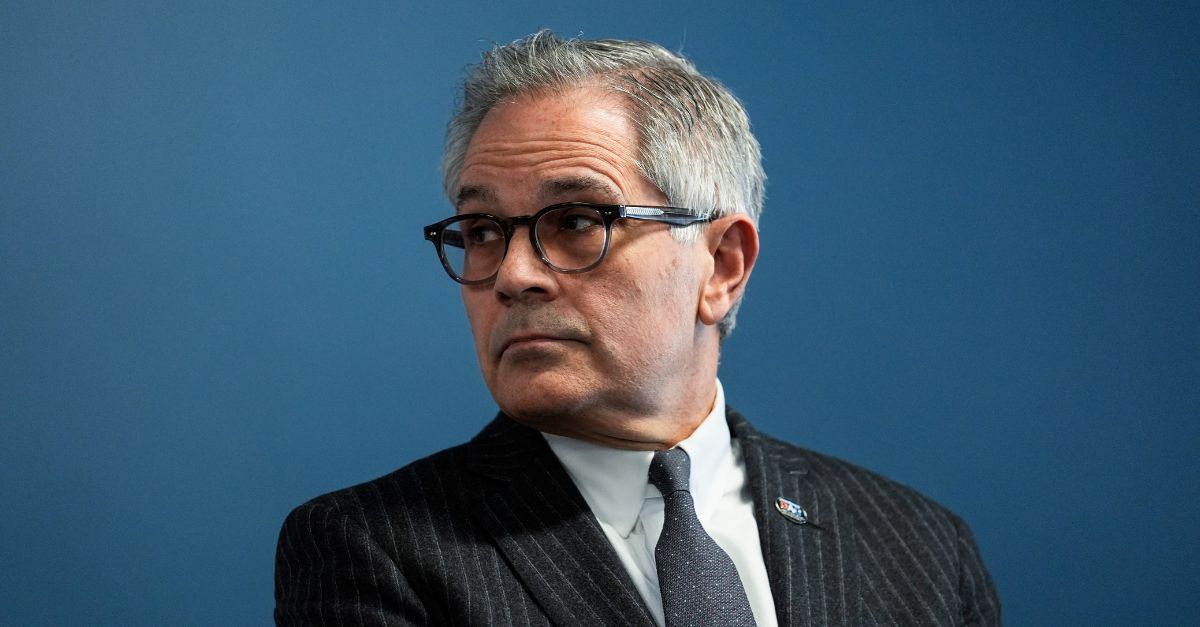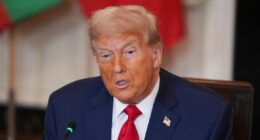
Philadelphia District Attorney Larry Krasner takes part in a news conference in Philadelphia, Monday, March 11, 2024 (AP Photo/Matt Rourke).
A federal appeals court ruled Monday that the progressive Philadelphia District Attorney must face a lawsuit by an Orthodox Jewish former Assistant District Attorney for denying her religious exemption to the office’s COVID-19 vaccination mandate. Because it was unclear whether the office’s policy was rooted in hostility toward religion, the matter was sent for a jury to decide.
A three-judge panel of the U.S. Court of Appeals for the Third Circuit unanimously overturned a lower court ruling that dismissed Rachel Spivack’s case against Larry Krasner (D), the elected District Attorney of Philadelphia whose 2022 impeachment was overturned as constitutionally unsound. As a result, the case will move toward trial.
The panel included Barack Obama appointee U.S. Circuit Judge Cheryl Ann Krause, and Joe Biden appointees U.S. Circuit Judges Arianna J. Freeman and Tamika Montgomery-Reeves. Freeman penned the 42-page ruling for the panel.
Krasner’s evolving vaccination requirement
Krasner issued policies for the District Attorney’s Office (DAO) under his broad authority to manage the office as an independently elected official. In August 2021, the DAO implemented a vaccine mandate that allowed for a religious exemption.
At the time, the policy said religious exemptions would be granted “absent undue hardship, to employees with verifiable, sincerely held religious beliefs, observances, or practices that conflict with getting vaccinated.” Such requests for exemptions were to be handled “on a case-by-case basis considering various factors and based on an individualized assessment in each situation.”
Krasner said the office changed its policy in January 2022, coincident with the rise of the Omicron variant of COVID-19. Krasner said a result of the change, religious exemptions were no longer evaluated on a case-by-case basis, but rather, were categorically denied. According to Freeman’s decision, however, the underlying record “invites some questions” as to what the precise terms of the policy change were and whether the change was actually put into effect.
Spivack’s request for exemption
Spivack graduated from law school in spring 2021 and registered to take the Pennsylvania bar exam remotely in July 2021 in preparation to begin work at the DAO that September. However, Spivack was not permitted to take the exam that summer after she failed to comply with the remote testing requirements. After Spivack informed her future employer that she would be unable to take the bar exam, she was informed that the DAO would assign her to an ADA position that did not require a license to practice law in Pennsylvania. The position Spivack was ultimately offered by the DAO was that of an at-will employee.
In August 2021, Spivack learned about the vaccination policy. In September 2021, less than a week before beginning her new job, Spivack submitted a religious exemption request in which she said, “[a]ll three available brands of COVID-19 vaccines constitute a profound violation of the scriptural prohibitions against forbidden mixtures,” and that “[i]njecting such forbidden substances directly into our bloodstream completely challenges scriptural teaching that regards one’s body as the repository of the soul made in God’s image.” Spivack said she objected not only to COVID-19 vaccines, but to all vaccines and said she had not received any vaccines in the last decade.
She also included a letter from her rabbi that said, she “is an orthodox Jew who is fully observant of Scriptural and rabbinic laws and guidance.” The letter also said that Spivack’s “religious grounds for declining this vaccination are valid and reflect deep personal commitment to her religious practice.”
The DAO denies the request
In December 2021, Spivack and other recent hires received an email from the DAO asking that they provide proof of vaccination. Krasner later testified that, at the time, the office had still not decided how it would handle religious exemptions, but that he was uncomfortable with the idea of adjudicating the sincerity of individual employees’ religious beliefs — as would be necessary under the earlier religious exemption policy.
In March 2022, Spivack learned that her religious exemption had been denied. A few days later, she received a form letter that said the office’s mandate was neutral and including the following language:
In addition to the law permitting the DAO’s neutral COVID-19 vaccine policy and not requiring accommodations if they constitute an undue burden for the DAO, Rachel Spivack does not present a credible claim that their opposition to the vaccine was based on their religious beliefs. The fact that an individual is religiously devout does not by itself qualify them under the law for a religious exemption. DAO has not designated which currently approved COVID-19 vaccine an employee must take. Consequently, to the extent an employee opposes how the vaccine was manufactured, they have other COVID-19 vaccines from which to choose.
After she was fired, Spivack in April 2022 sued Krasner and the City of Philadelphia in federal district court in Pennsylvania under the First Amendment’s free exercise clause and the Pennsylvania Religious Freedom Protection Act.
The legal proceedings to follow
The district court granted summary judgment in Krasner’s favor, finding that the vaccine mandate “was intended to prevent sickness and death to the maximum extent possible.” The court held that the vaccine mandate was both neutral and generally applicable as a matter of law, and therefore subject to rational basis review — the lowest legal standard.
The Third Circuit’s reversal was based on its finding that conflicting facts introduced at the district court level warrant further fact-finding by a jury to determine whether 1) the DAO’s vaccine mandate was neutral and generally applicable or whether there was reason to believe an anti-religious bias was in play; and 2) whether Spivack’s exemption request had been evaluated under the August 2021 or the January 2022 policy.
From the ruling:
There is, however, a dispute of material fact as to whether anti-religious hostility tainted the DAO’s treatment of religious exemptions. That is because a reasonable jury could conclude, based on some evidence in the record, that the DAO’s treatment of religious exemptions reflected “intoleran[ce] of religious beliefs.”
Possible anti-religious bias
Freeman said in the panel’s ruling that given Krasner’s role as primary decisionmaker responsible for the office’s vaccine policies, his comments “merit particular scrutiny.”
The court pointed to statements Krasner made during his deposition when he said:
There are some people who are just flat-out unscientific and there are some people who are not as concerned as they really should be for their fellow human beings and, so, we find ourselves in a situation where we have, basically, people who are denying science and are endangering others and it’s wrong.
Freeman said Krasner’s testimony could be interpreted by a jury to show hostility toward those seeking religious exemptions.
Freeman explained that there was also evidence in the record for the opposite finding.
“For one thing, Spivack admitted in her deposition that she never heard from anyone at the DAO that Krasner is hostile to religion,” Freeman wrote. “Krasner testified that he respected Spivack’s beliefs and those of other religiously observant people.”
Krasner, for his part, also said “he ‘d[id] not want to be in a position of judging what people’s beliefs are sincere and what people’s beliefs are not sincere.””
Further, during the lower court proceedings, Krasner said in retrospect, he would have allowed Spivack to remain unvaccinated and simply work remotely.
The case will now move forward toward trial to resolve the disputed factual matters.
Have a tip we should know? [email protected]








